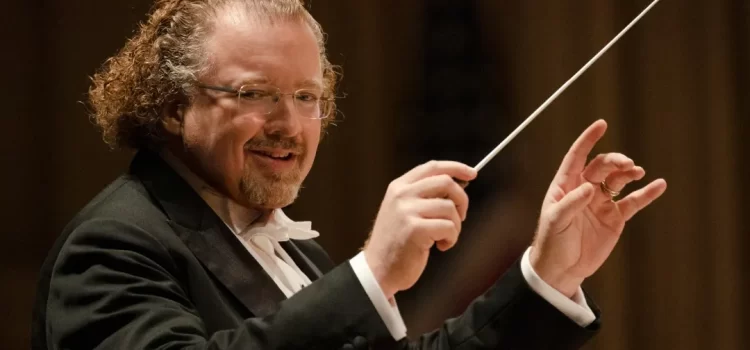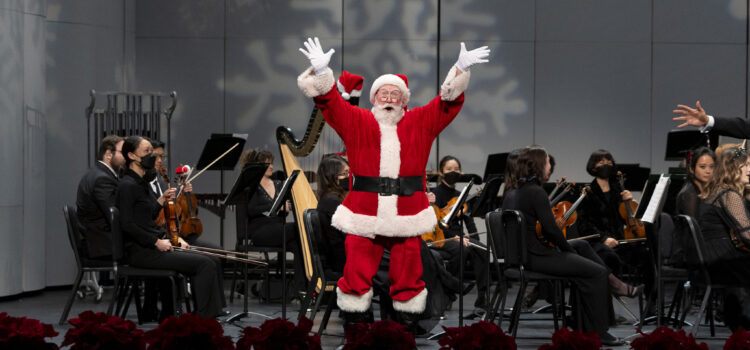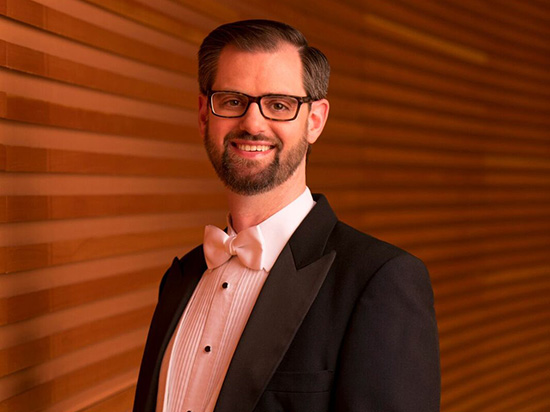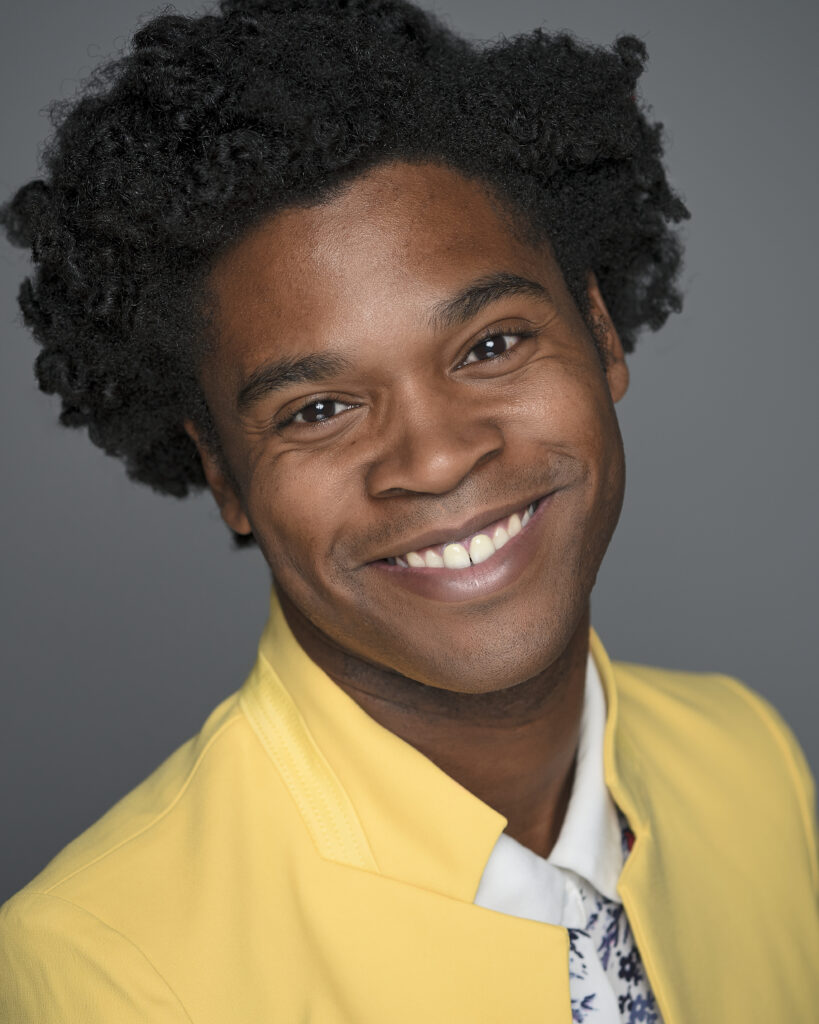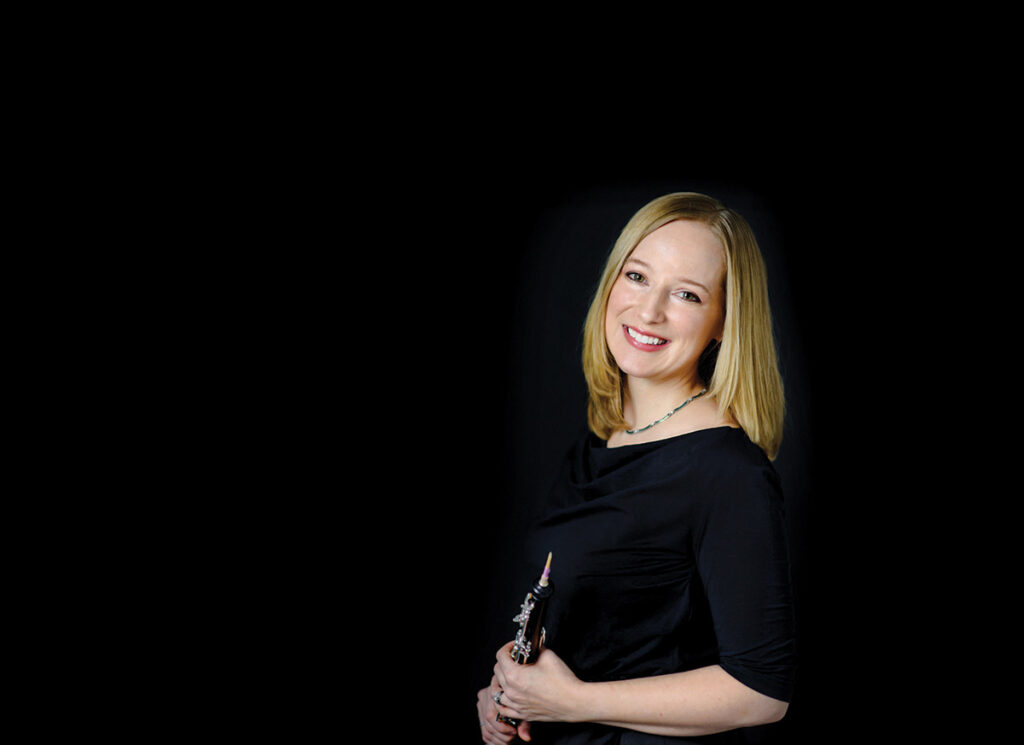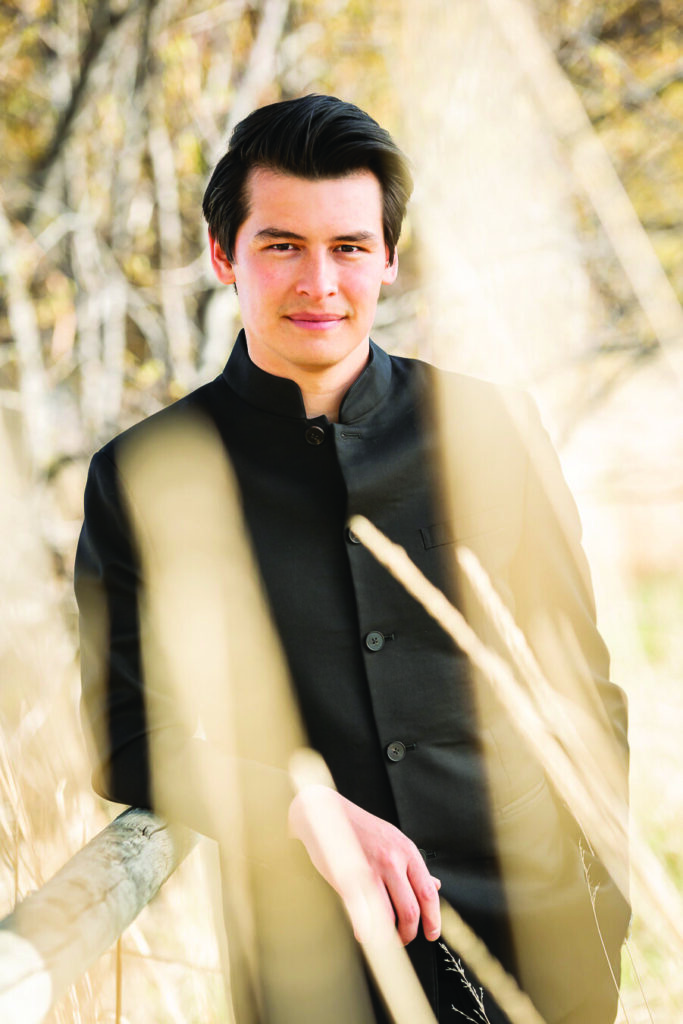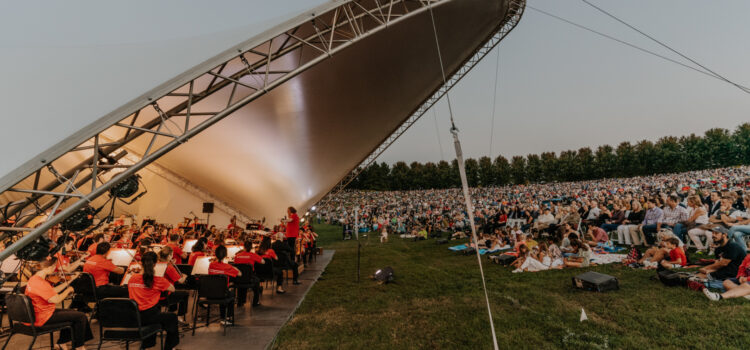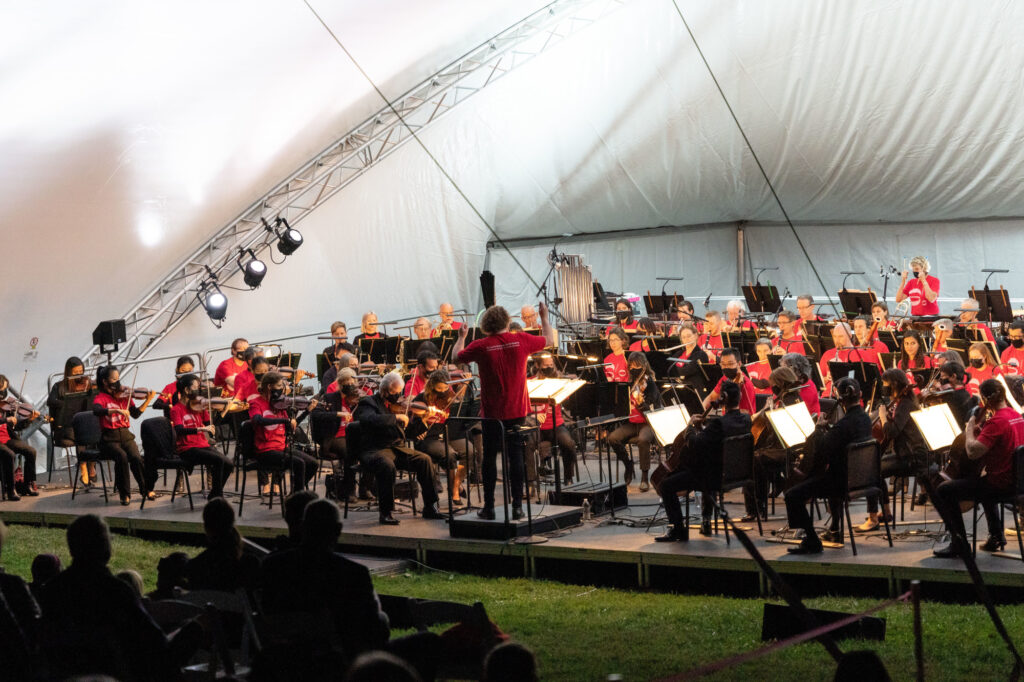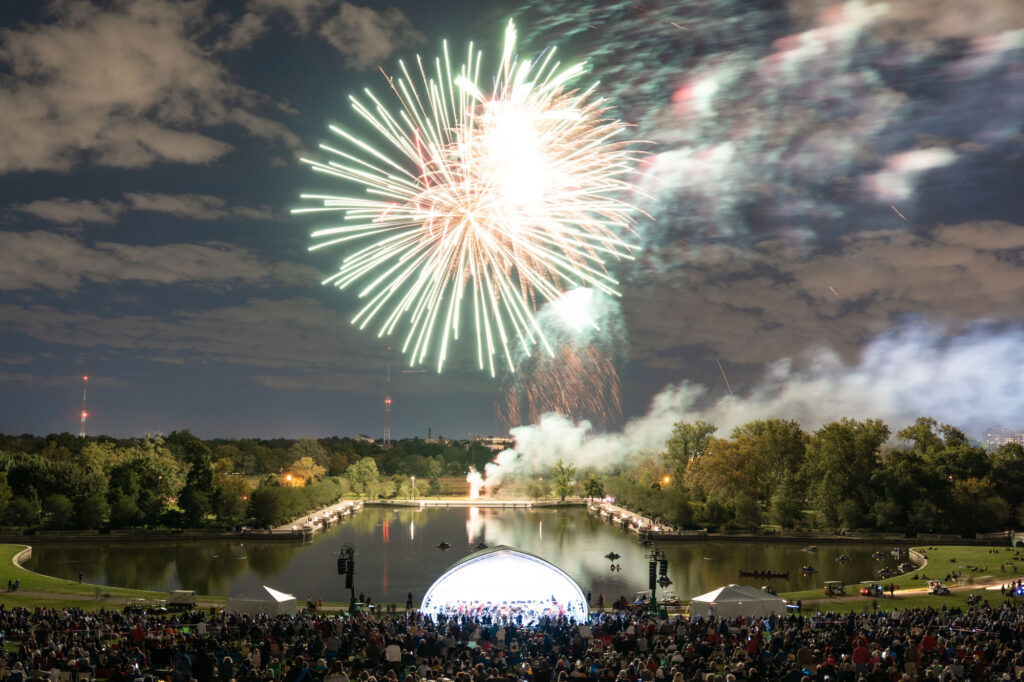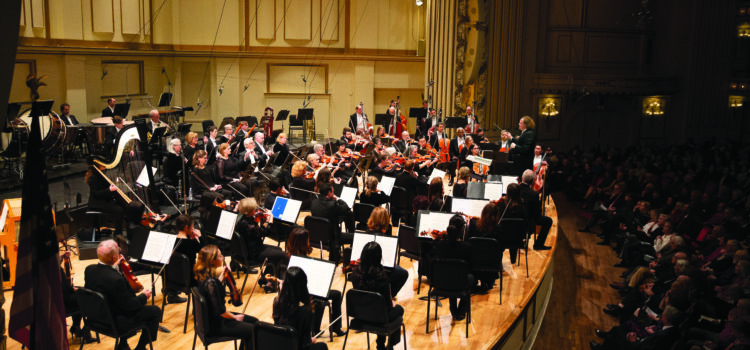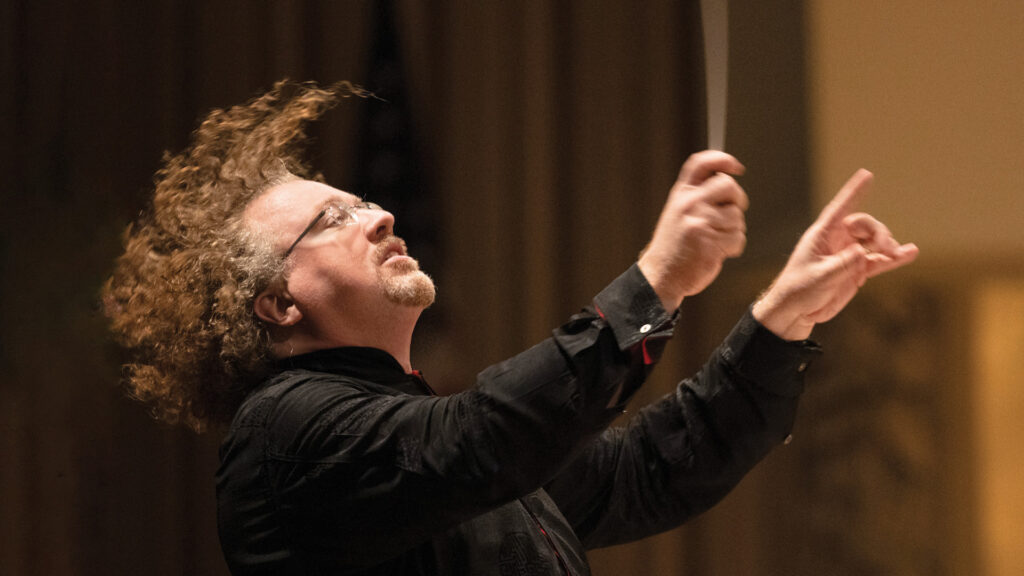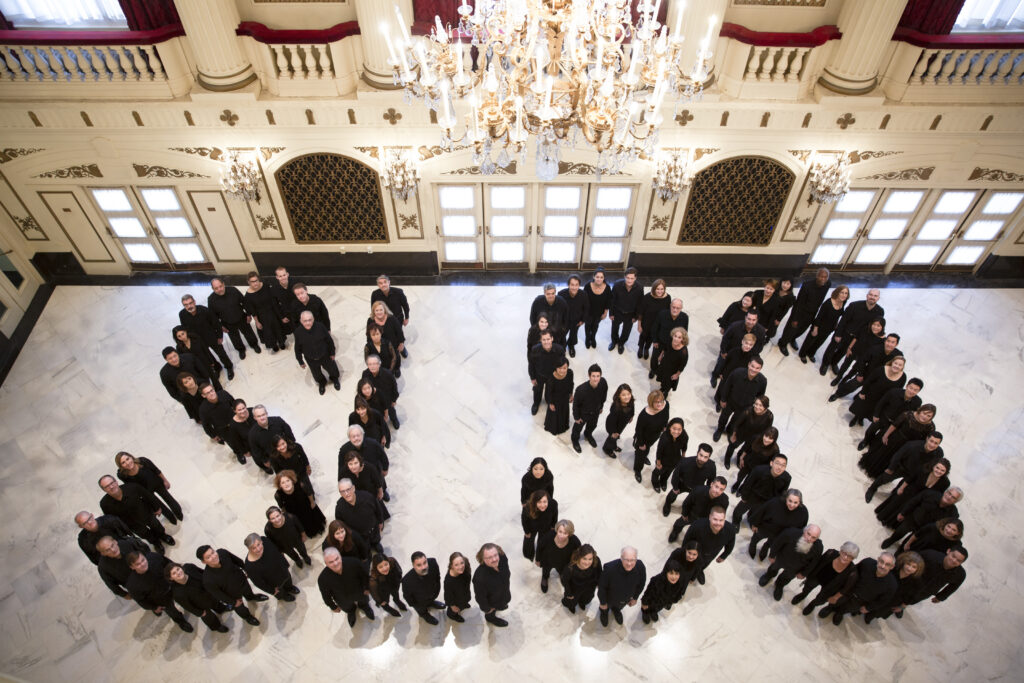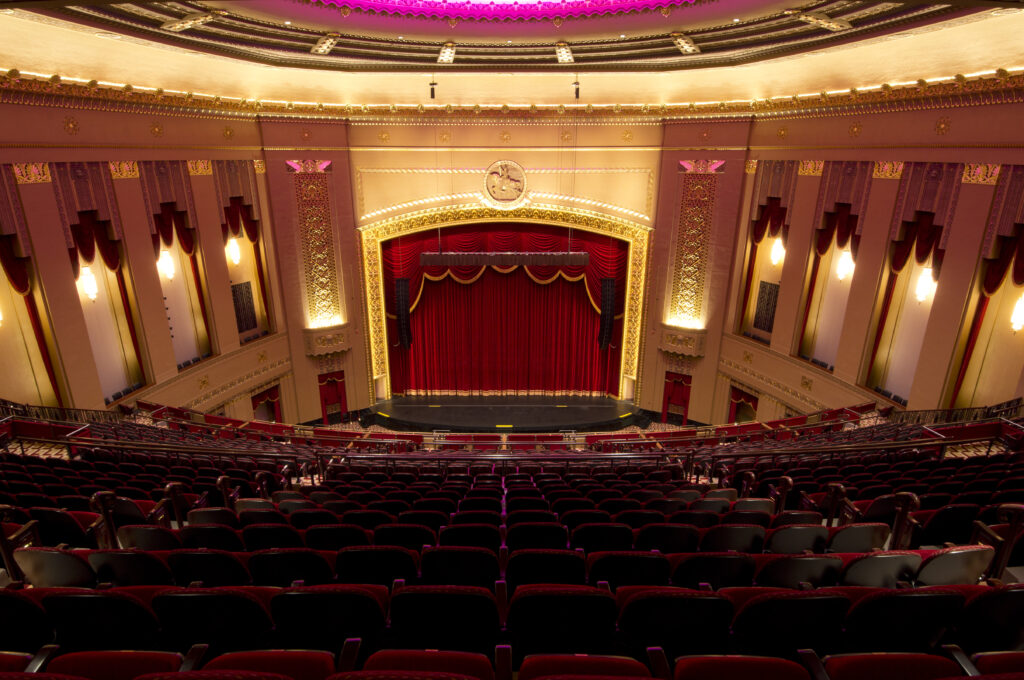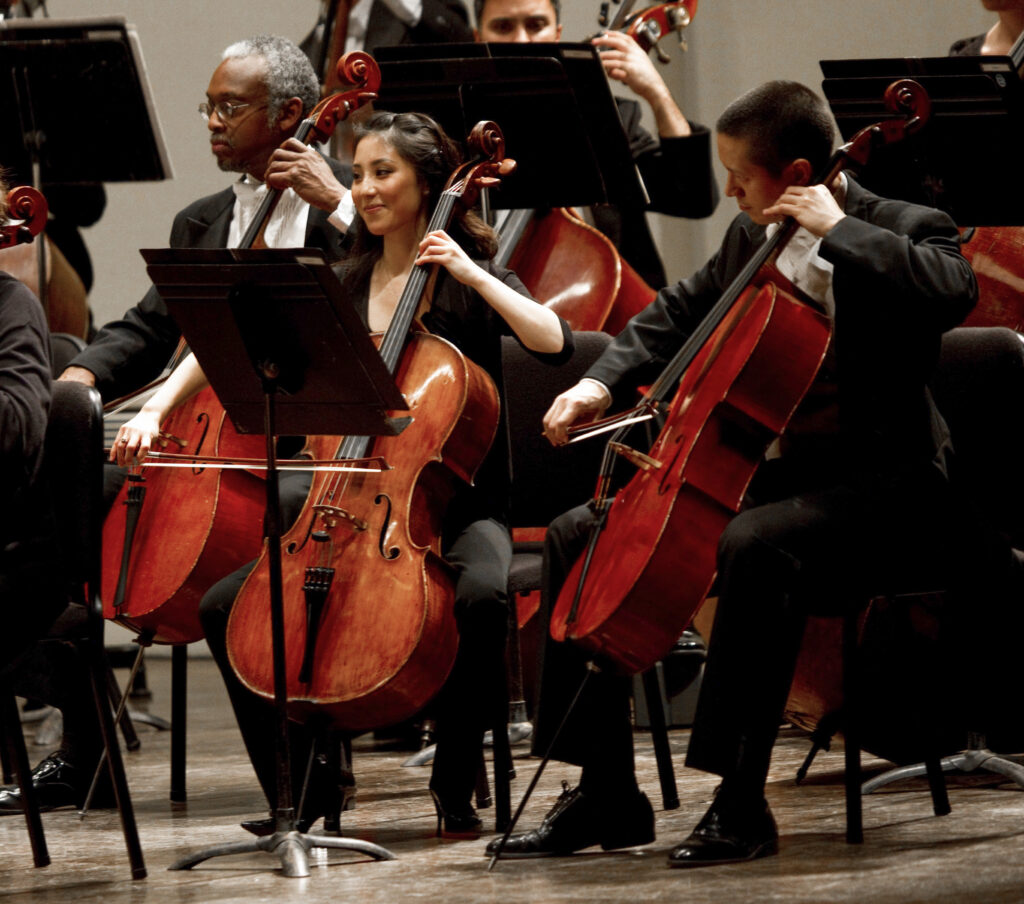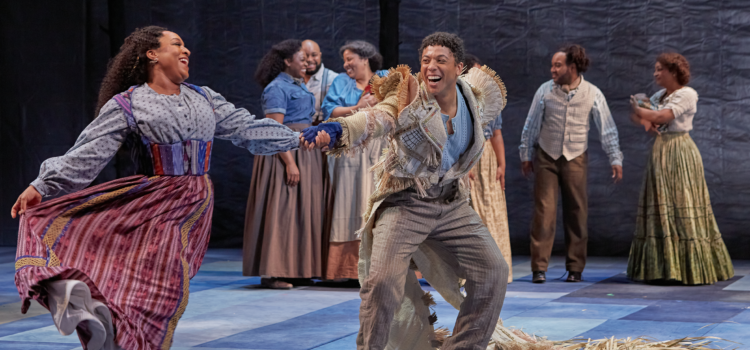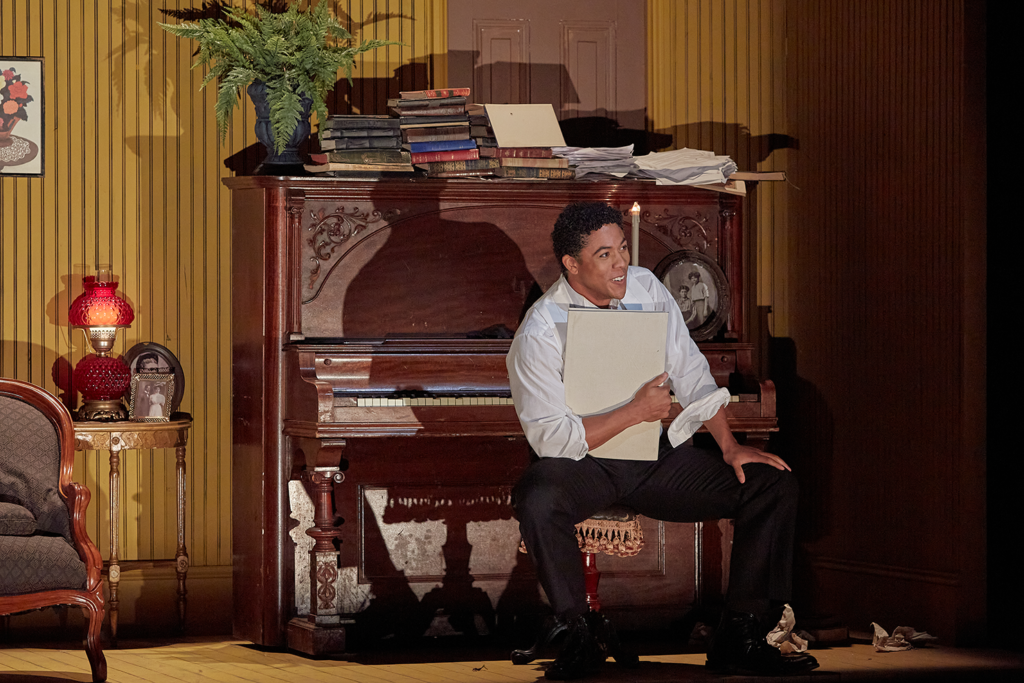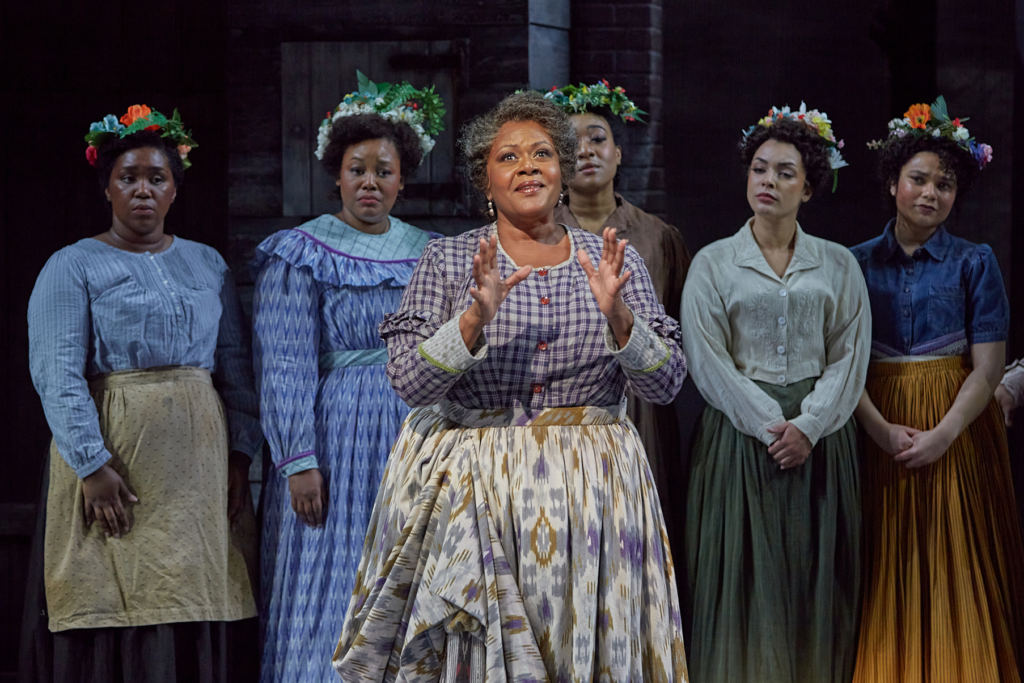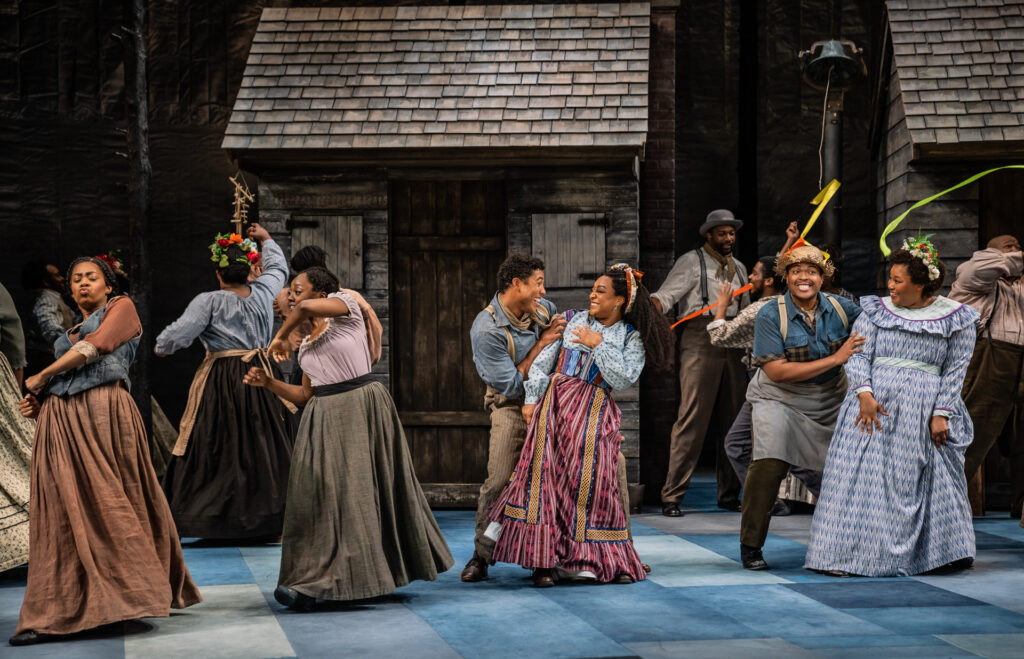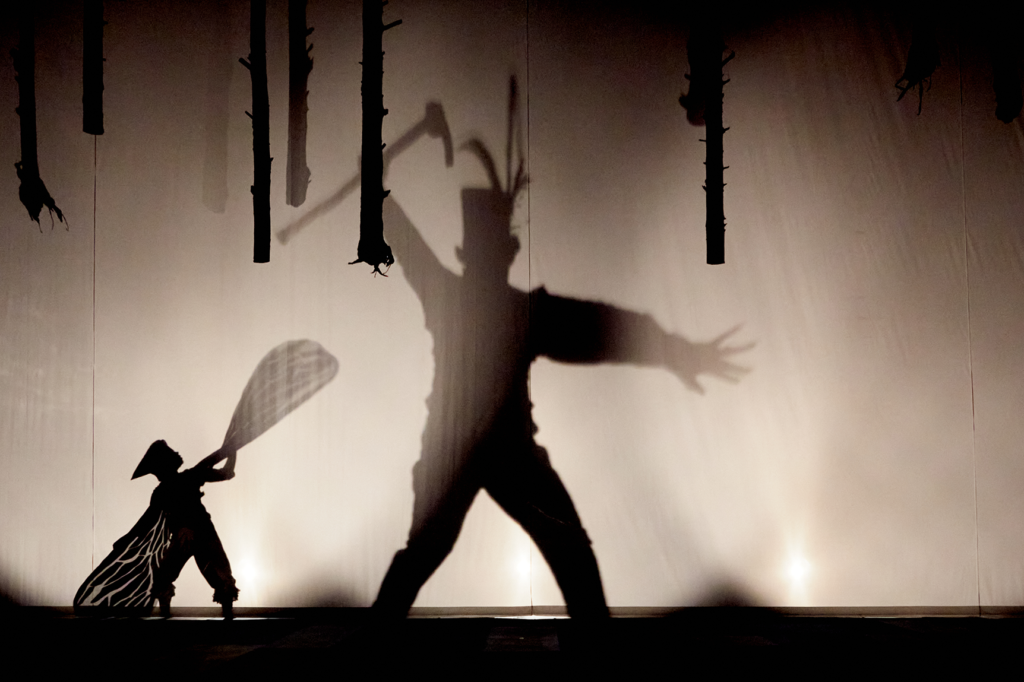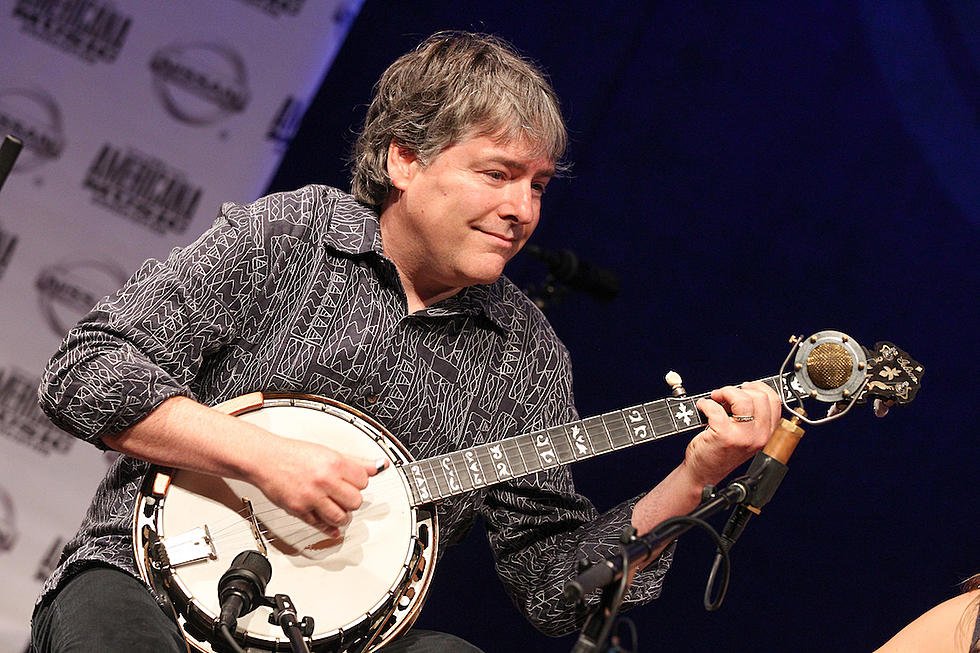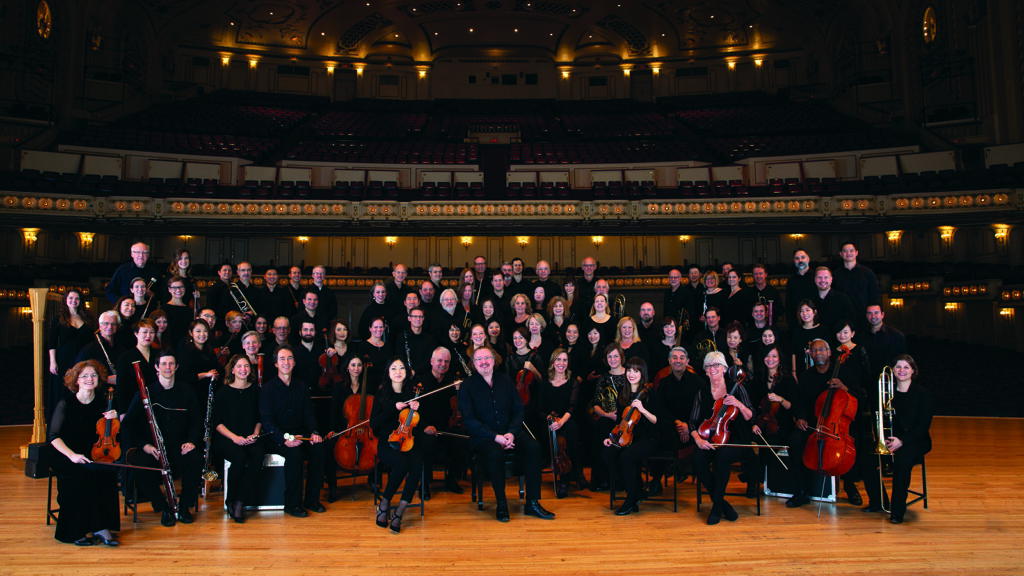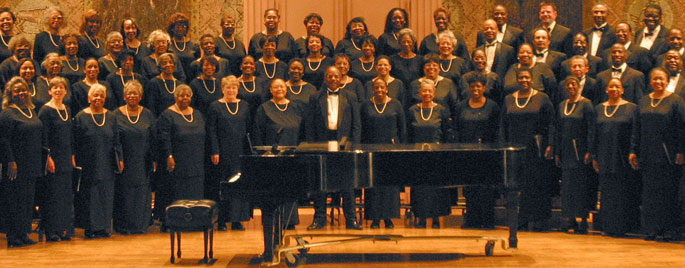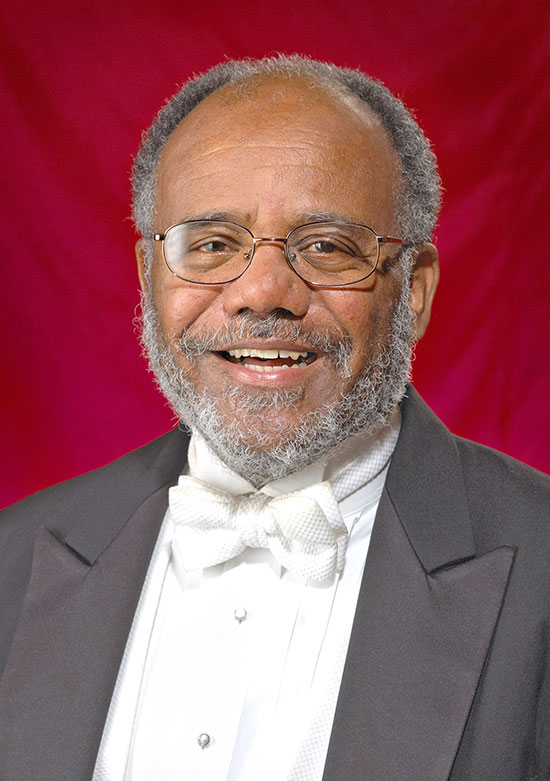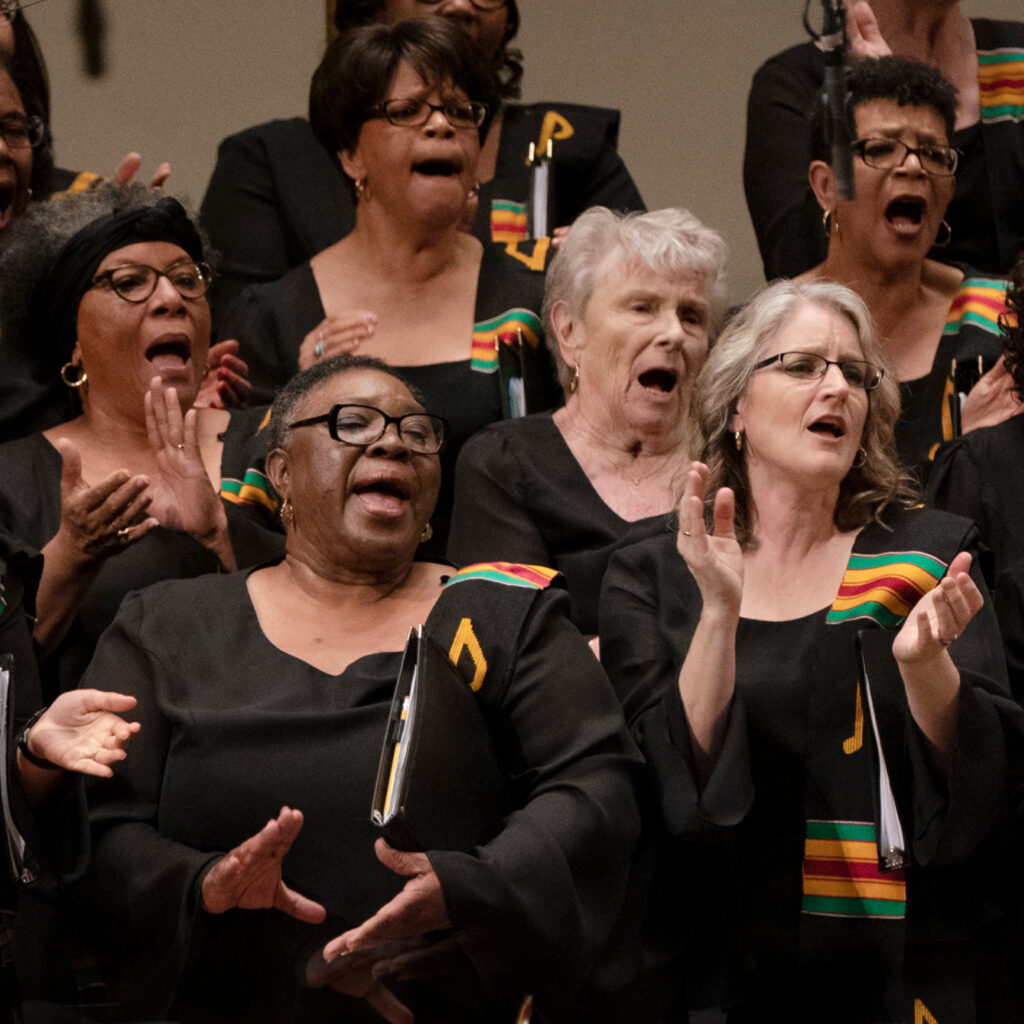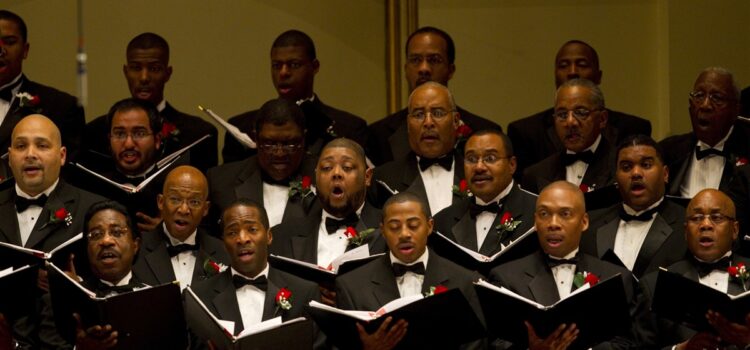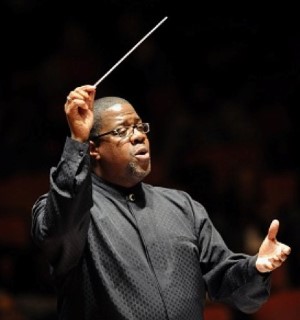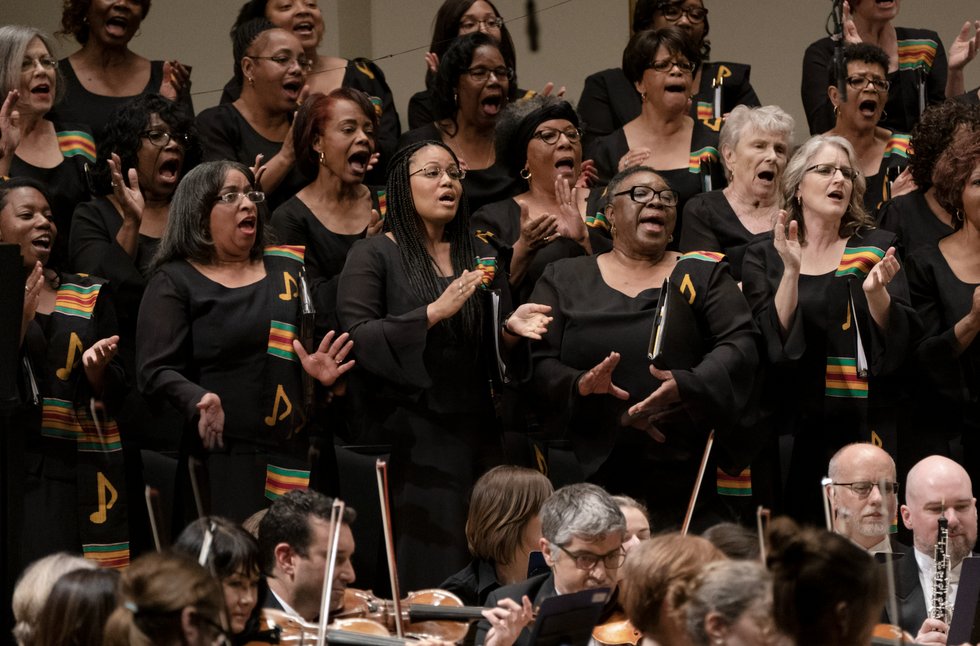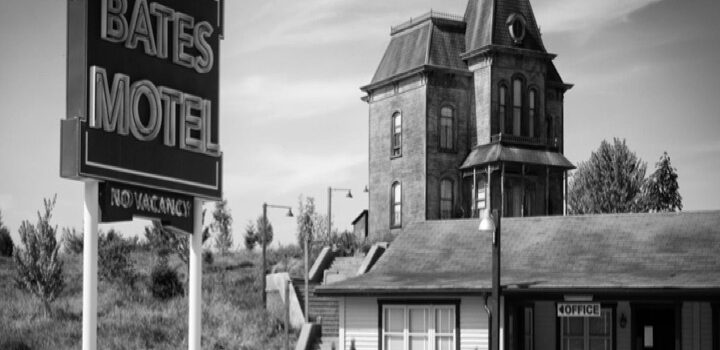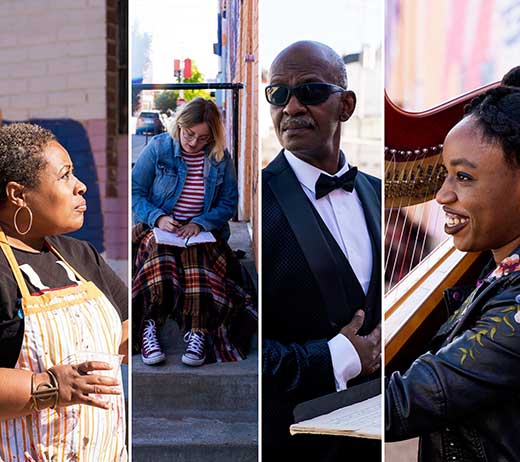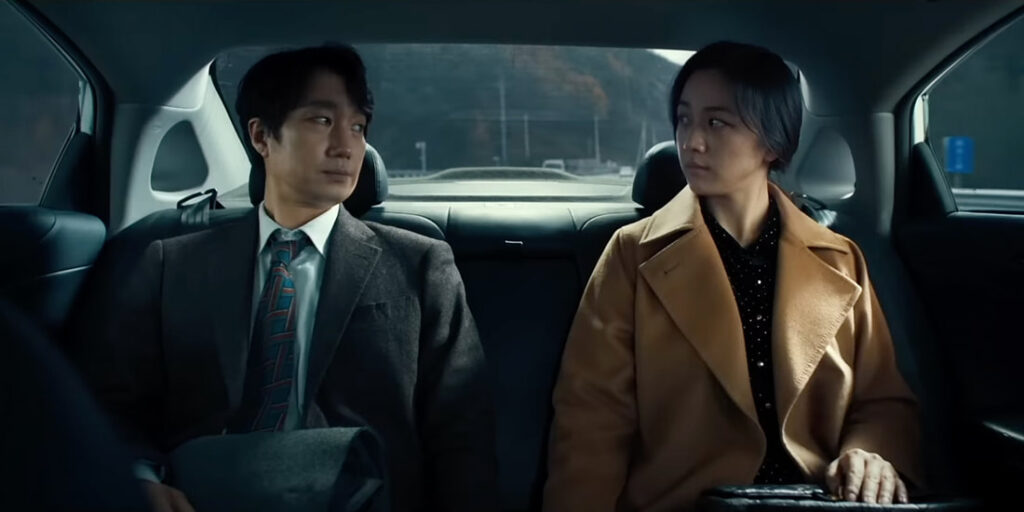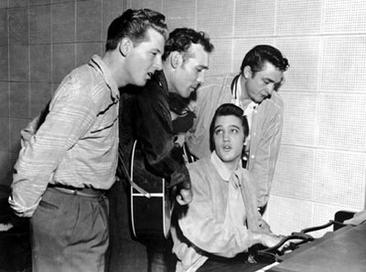THE SLSO OFFERS PERFORMANCES THROUGHOUT ST. LOUIS WHILE TRANSFORMATIONAL EXPANSION AND RENOVATION OF POWELL HALL PROCEEDS
SUBSCRIPTIONS ON SALE NOW; ADDITIONAL PROGRAMMING TO BE ANNOUNCED LATER
Highlights include:
- The free Forest Park concert on Art Hill on September 19, 2024, a St. Louis tradition for more than 55 years
- World premieres of two SLSO commissions: Anna Clyne’s PALETTE and Nina Shekhar’s Accordion Concerto; an SLSO co-commission and U.S. premiere of Magnus Lindberg’s Viola Concerto; U.S. premieres of Guillaume Connesson’s Lost Horizons Violin Concerto and Daniel Slatkin’s Voyager 130; and the first SLSO performances of works by Mason Bates, Gabriela Lena Frank, Detlev Glanert, Adolphus Hailstork, James MacMillan, Cindy McTee, Kevin Puts, Outi Tarkiainen, John Williams, and more
- Denève leading two programs exploring Mozart’s output from musical prodigy to Classical era icon
- A theatrical version of Edvard Grieg’s Peer Gynt, led by Denève with writing and direction by Bill Barclay and actors from Concert Theatre Works, to conclude the season
- A program celebrating Conductor Laureate Leonard Slatkin’s legacy, with music by himself and his family
- The second season of the Live at The Sheldon series, chamber music concerts curated by SLSO musicians featuring a variety of chamber music repertoire including world premieres by student composers at the University of Missouri, building on a successful inaugural season
- The 21st Live at the Pulitzer season, curated by St. Louis-based composer Christopher Stark
- Artists making their first SLSO appearances include conductors David Afkham, Patrick Dupré Quigley, and Ruth Reinhardt; pianist Yeol Eum Son; Hardanger fiddle player Vidar Skrede; violist Lawrence Power; cellist Andrei Ioniță; accordionist Hanzhi Wang; and vocalists Ben Bliss, Brandon Cedel, and Jamez McCorkle
- Returning artists include conductors Daniela Candillari, David Danzmayr, Jonathon Heyward, Hannu Lintu, Cristian Măcelaru, Gemma New, Leonard Slatkin, and John Storgårds; pianists Behzod Abduraimov, Saleem Ashkar, Kirill Gerstein, Nikolai Lugansky, and Conrad Tao; violinists James Ehnes, Gil Shaham, Akiko Suwanai, and Christian Tetzlaff; and vocalists Dashon Burton, Sasha Cooke, Joélle Harvey, Kelley O’Connor, Susanna Phillips, Michael Spyres, and Camilla Tilling
- Programming that showcases the entire family of SLSO ensembles: the St. Louis Symphony Chorus, St. Louis Symphony IN UNISON Chorus with Director Kevin McBeth, and the St. Louis Symphony Youth Orchestra
The St. Louis Symphony Orchestra (SLSO) and Stéphane Denève, The Joseph and Emily Rauh Pulitzer Music Director, have announced programming for the orchestra’s 2024/2025 season, the orchestra’s 145th and Denève’s sixth as Music Director.
While the transformational expansion and renovation of the orchestra’s historic home at Powell Hall progresses, the orchestra will perform throughout the St. Louis region, connecting with communities where they are and showcasing the signature sound of the orchestra and the talents of its remarkable musicians. As the orchestra spends a second season away from its musical home, programming reflects themes of new perspectives discovered through traveling.
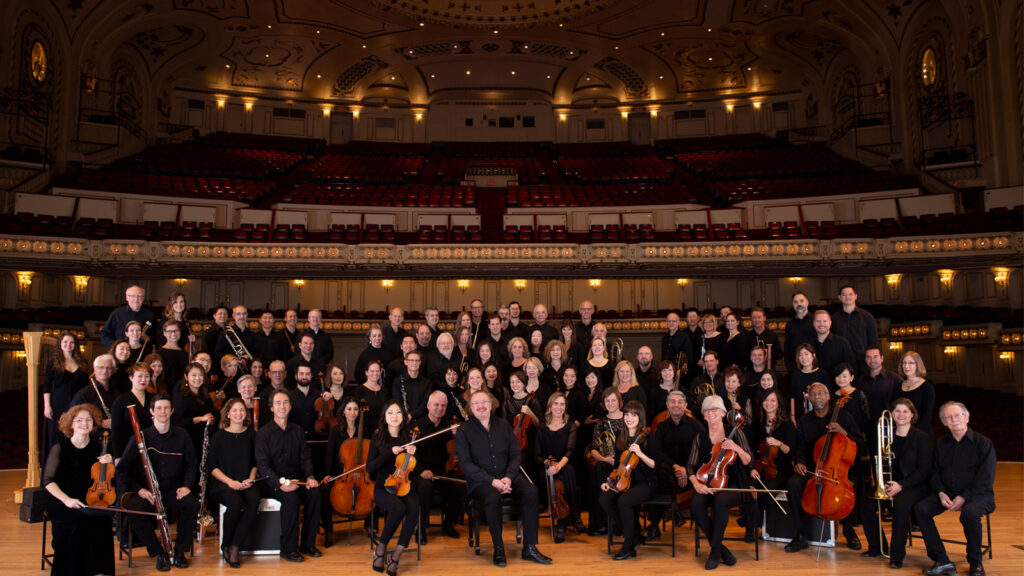
Stéphane Denève, The Joseph and Emily Rauh Pulitzer Music Director of the SLSO, said, “The versatility, virtuosity, and vibrancy of our wonderful musicians will be on display throughout this season—from well-known symphonic favorites and family concerts to film scores and chamber music. As we spend a second season away from our beloved Powell Hall, our 24/25 season will reflect on the meaning of home—from Mozart’s travels as a rising composer to Guillaume Connesson’s musical search for the Shangri-La paradise and Mason Bates’ Nomad Concerto, and more. Many amazing guest artists will bring their talents to St. Louis, and we are excited to offer music from voices of today including Anna Clyne, Detlev Glanert, Nina Shekhar, Adolphus Hailstork, and many others. It is a joy to be living in St. Louis and to connect with audiences throughout the community as the SLSO and I anticipate returning to our musical home in 2025.”
Marie-Hélène Bernard, SLSO President and CEO, said,“Our 24/25 season offers a wide variety of memorable music experiences, tapping into the remarkable talents of our musicians, and meeting audiences where they are as the transformational expansion and renovation of Powell Hall progresses. Under Stéphane’s spirited and creative leadership, some of today’s most celebrated artists, composers, and conductors will join our orchestra and choruses to share beloved works, world and U.S. premieres, and meaningful musical experiences unique to St. Louis. We look forward to making new memories with our audiences this year as we share the joyous and transformative power of music throughout the region.”
Bjorn Ranheim and Chris Tantillo, co-chairs of the SLSO Musicians’ Council, said, “It is a joy and honor for the musicians of the SLSO to share our music throughout the community during this time of renovation and renewal of our beloved Powell Hall. We are incredibly grateful for the support of our loyal audiences and excited about the tremendous variety of world-class programming that we will present during the 2024/2025 season.”
Throughout the season, the orchestra will share music in several venues throughout the community, including:
- The Touhill Performing Arts Center at the University of Missouri–St. Louis
- Stifel Theatre
- J. Scheidegger Center for Performing Arts at Lindenwood University (St. Charles)
- The Sheldon
- Pulitzer Arts Foundation
- The E. Desmond Lee Concert Hall, 560 Music Center at Washington University (University City)
Curated and Compose Your Own Subscriptions are on sale now. Single tickets for specials, films, and holiday concerts go on sale in May 2024. Single tickets for classical concerts go on sale in summer 2024. Visit slso.org/season or call the Box Office at 314-534-1700 for more information.
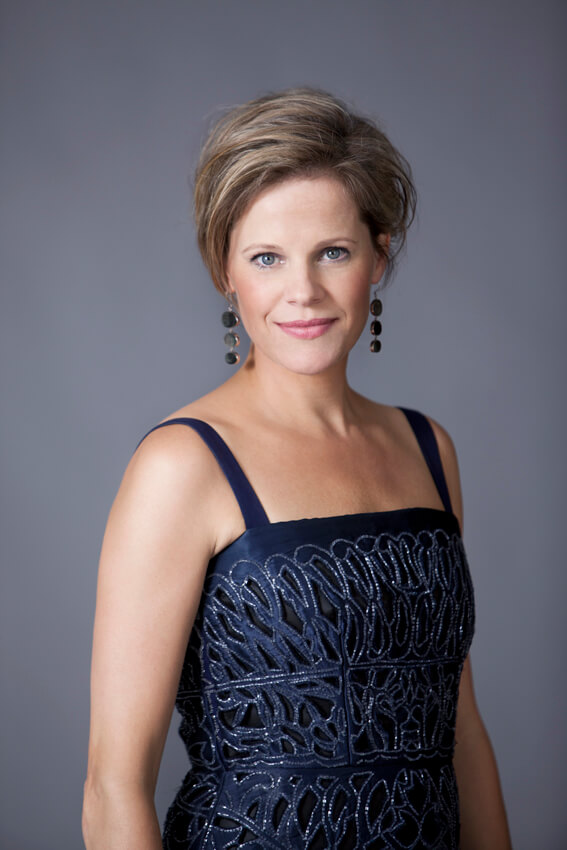
Season highlights and collaborations with Denève
Denève leads a host of programs, with repertoire spanning genre and time. Following the annual community concert in Forest Park, he opens the season with the much-anticipated return of violinist Gil Shaham, a close collaborator of Denève’s and frequent SLSO guest, giving the first SLSO performances of Mason Bates’ Nomad Concerto. Denève closes the season with a semi-staged version of Edvard Grieg’s opera Peer Gynt, with internationally renowned soprano Camilla Tilling serving in the lead role of Solveig and Vidar Skrede on Hardanger fiddle. These performances of Peer Gynt include staging, costumes, and actors, led by acclaimed writer and director Bill Barclay in adaptation of the Henrik Ibsen play.
Throughout the season, Denève conducts the SLSO in some of symphonic music’s most beloved works including Hector Berlioz’s Symphonie fantastique, Gustav Mahler’s Symphony No. 1, Pyotr Ilyich Tchaikovsky’s Romeo and Juliet Overture-Fantasy, and Maurice Ravel’s Bolero, alongside the first SLSO performances of many works, including Guillaume Connesson’s Lost Horizons Violin Concerto, Adolphus Hailstork’s An American Port of Call, John Williams’ Theme from Seven Years in Tibet, and more. Denève also leads the orchestra in a live presentation of John Williams’ score to E.T. the Extra-Terrestrial, a formative film in his life, while the film plays.
Denève and the orchestra take audiences a two-week exploration of the music of W.A. Mozart. The first week features Mozart’s brooding late-in-life works including the Requiem with vocalists Joélle Harvey, Kelley O’Connor, Ben Bliss, and Dashon Burton and the Adagio and Fugue in C minor. The second week explores Mozart’s journeys away from home in works including the Symphony Nos. 1 and 31, “Paris”; Piano Concerto No. 20 with Behzod Abduraimov; and the overture to the rarely heard opera Mitridate, rè di Ponto. Additional pieces from contemporary composers Detlev Glanert and Anna Clyne connect Mozart’s music to today.
Denève extends his tradition of meaningful artistic partnerships, collaborating with internationally renowned artists, including Grammy Award-winning violinist James Ehnes on Beethoven’s Violin Concerto,and Akiko Suwanai on the U.S. premiere of Guillaume Connesson’s Lost Horizons Violin Concerto. A leading interpreter of the music of Maurice Ravel, Denève and pianist Kirill Gerstein, a frequent SLSO guest artist, collaborate on Ravel’s Piano Concerto in G and Concerto for the Left Hand in the same program in celebration of the composer’s 150th birthday. Pianist Nikolai Lugansky returns for performances of Sergei Rachmaninoff’s Piano Concerto No. 2 and tenor Michael Spyres, who received critical acclaim in the title role in the 2023 SLSO performances of Hector Berlioz’s The Damnation of Faust, returns to sing Benjamin Britten’s Les Illuminations and Mahler’s Songs of a Wayfarer in a program of signature music for Denève.
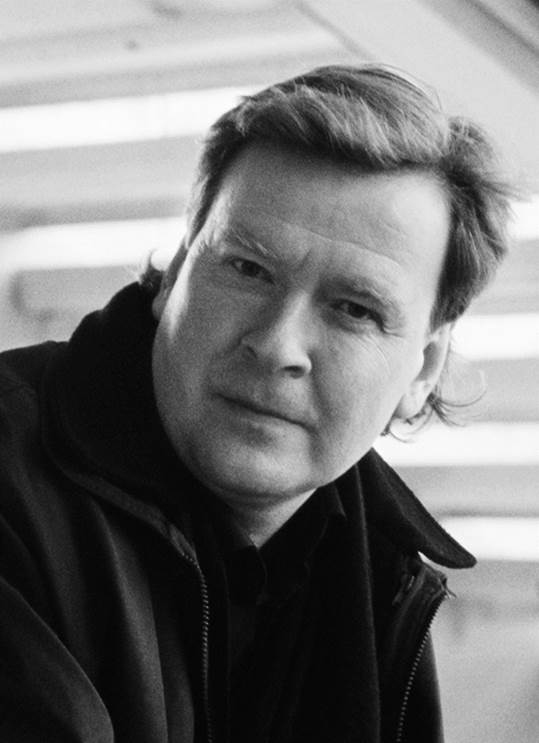
WORLD AND SLSO PREMIERES
More than 20 pieces enter the SLSO’s repertoire during the 2024/2025 season, including 12 works by living composers. In addition to world premieres by Anna Clyne and Nina Shekhar and U.S. premieres by Guillaume Connesson, Magnus Lindberg, and Daniel Slatkin, the SLSO performs works by living composers including Mason Bates, Gabriela Lena Frank, Detlev Glanert, Adolphus Hailstork, James MacMillan, Cindy McTee, Kevin Puts, Outi Tarkiainen, and John Williams.
Nina Shekhar’s Accordion Concerto, an SLSO commission,will receive its world premiere with conductor Daniela Candillari, Opera Theatre of Saint Louis’ Principal Conductor, and accordionist Hanzhi Wang (January 10-11). Wang, a noted interpreter of her instrument, makes her SLSO debut to perform the concerto.
Anna Clyne’s PALETTE, an SLSO commission, combines electronically augmented sounds captured from microphones placed among the musicians with the live orchestral performance for a unique sonic experience (February 14-15). Denève leads this world premiere. A champion of Clyne’s music, Denève has conducted three of Clyne’s pieces since beginning his tenure in September 2019. The SLSO gave the U.S. premiere of Clyne’s PIVOT in November 2021 with conductor David Danzmayr.
Magnus Lindberg’s Viola Concerto,an SLSO co-commission, will receive its world premiere in February 2024 with the Finnish Radio Symphony Orchestra and soloist Lawrence Power, who will also give the U.S. premiere performance with the SLSO and conductor Hannu Lintu, a fellow Finn and close collaborator (March 14 & 16).
Guillaume Connesson’s Lost Horizons Violin Concerto tells the story of the search for the famed paradise, Shangri-La, and will be performed by Akiko Suwanai as violin soloist (March 21-22), led by Denève. Since his Music Directorship began in 2019, Denève has championed Connesson’s music in St. Louis, leading performances of three of his works with the orchestra, including the world premiere of Astéria in November 2022.
Daniel Slatkin’s Voyager 130 completes the opening half of a program celebrating the legacy of Conductor Laureate Leonard Slatkin, Daniel Slatkin’s father (October 25 & 27). A prolific composer for film and television, Slatkin found inspiration for this concert piece, which tells the story of the Voyager spacecrafts, from Beethoven’s 13th string quartet.
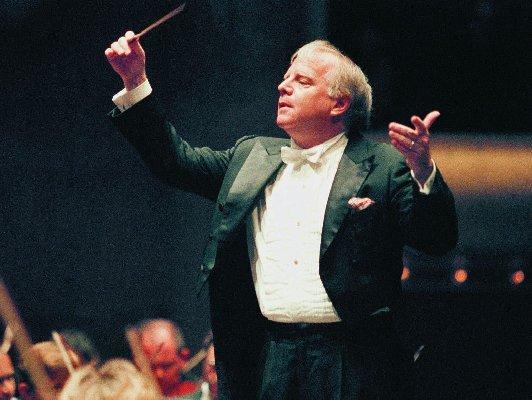
CELEBRATING LEONARD SLATKIN’S LEGACY
A weekend of concerts celebrates the legacy of SLSO celebrates Conductor Laureate Leonard Slatkin. Slatkin—who served as the SLSO Music Director from 1979 to 1996—leads the orchestra in a family-oriented celebration. The program includes Timepiece by Cindy McTee, Leonard’s wife; the U.S. premiere of Voyager 130 by Daniel Slatkin, Leonard’s son; Leonard’s own arrangement of piano sonatas by Domenico Scarlatti for winds; and Tchaikovsky’s Symphony No. 5, a signature work which Leonard took on multiple tours with the orchestra. Details of additional events will be announced later.
24/25 SEASON VENUES
The SLSO will welcome audiences at venues throughout the St. Louis region, while the transformative expansion and renovation of Powell Hall, the orchestra’s historic home, progresses. Concerts will take place at several venues:
- The Touhill Performing Arts Center at the University of Missouri–St. Louis will serve as a venue for symphonic programming, after serving in the same capacity throughout the current season. The SLSO will perform in the Anheuser-Busch Performance Hall, which seats 1,600.
· Stifel Theatre, a 3,100-seat venuein downtown St. Louis, will host a combination of symphonic, choral-orchestral, film, holiday, and special concerts.
- The J. Scheidegger Center for Performing Arts at Lindenwood University in St. Charles will again host SLSO holiday concerts (December 17-18).
- The Pulitzer Arts Foundation in Grand Center will again serve as the venue for the Live at the Pulitzer series, providing an intimate atmosphere for the 21st season of the adventurous chamber music series.
- The Sheldon in Grand Center will again host the Live at The Sheldon chamber music series, providing an acoustically rich environment to elevate the individual talents of SLSO musicians.
- The E. Desmond Lee Concert Hall, 560 Music Center at Washington will welcome the orchestra for a weekend of Baroque Music featuring SLSO soloists (December 6-7).
ARTIST DEBUTS

Throughout the 24/25 season, many acclaimed artists will make their SLSO debut.
Conductor David Afkham, Chief Conductor and Artistic Director of the Spanish National Orchestra and Chorus, makes his SLSO debut on a program that includes Johannes Brahms’ Symphony No. 1. Rising German conductor Ruth Reinhardt makes her SLSO debut conducting music by Grażyna Bacewicz, Antonín Dvořák, and Paul Hindemith.
Instrumentalists making their SLSO debuts include: pianist Yeol Eum Son, a prizewinner at the International Tchaikovsky and Van Cliburn competitions, performing Sergei Prokofiev’s Piano Concerto No. 2; violist Lawrence Power, who will give the U.S. premiere of Magnus Lindberg’s Viola Concerto; cellist Andrei Ioniță, the Gold Medal winner of the 2015 International Tchaikovsky Competition, tackles Antonín Dvořák’s Cello Concerto; and accordionist Hanzhi Wang, an international ambassador for her instrument, gives the world premiere of Nina Shekhar’s Accordion Concerto. Vidar Skrede makes his debut on Edvard Grieg’s Peer Gynt on Hardanger fiddle.
Tenor Ben Bliss debuts in performances of W.A. Mozart’s Requiem, while tenor Jamez McCorkle and bass-baritone Brandon Cedel join the SLSO for Ludwig van Beethoven’s Symphony No. 9.
Federico Ramos, featured guitarist on the soundtrack of the Disney Pixar film Coco, reprises the role for the SLSO performances of the Germaine Franco score.
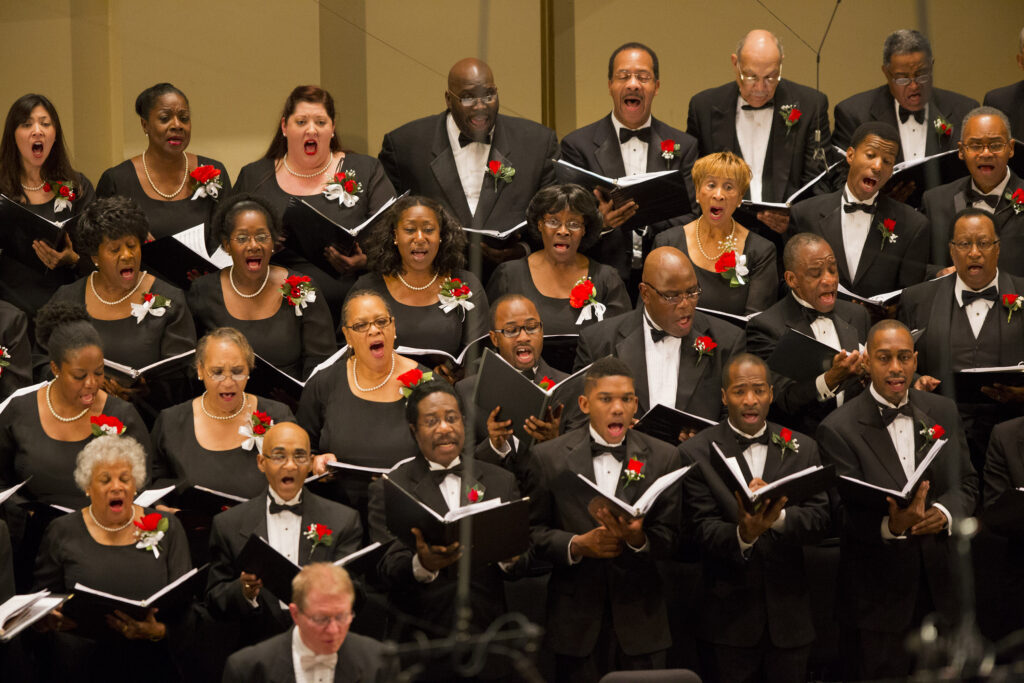
RETURNING ARTISTS AND SLSO ENSEMBLES
The world’s leading conductors Daniela Candillari, David Danzmayr, Jonathon Heyward, Hannu Lintu, Cristian Măcelaru, and John Storgårds return to lead the SLSO along with pianists including Behzod Abduraimov (Mozart’s Concerto No. 20), Saleem Ashkar (Mozart’s Concerto No. 24), Kirill Gerstein (Ravel’s Concerto in G and Concerto for the Left Hand), Nikolai Lugansky (Rachmaninoff’s Concerto No. 2), and Conrad Tao (Camille Saint-Saëns’ Concerto No. 2). Returning violinists include James Ehnes (Beethoven’s Concerto), Gil Shaham (Mason Bates’ Nomad Concerto), Akiko Suwanai (Guillaume Connesson’s Lost Horizons Concerto), and Christian Tetzlaff (Brahms’ Concerto).
Two SLSO musicians take center stage in the Baroque Christmas program: Associate Principal Violist Alejandro Valdepeñas in Telemann’s Viola Concerto in G major and piccolo player Ann Choomack in Vivaldi’s Piccolo Concerto in C major.
The St. Louis Symphony Chorus, which has performed repertoire from the entire choral-orchestral canon to critical acclaim since its formation in the 1976/1977 season, performs a trio of large-scale choral works: Mozart’s Requiem; Beethoven’s Symphony No. 9; and Grieg’s Peer Gynt. All choral performances will take place at Stifel Theater.
The St. Louis Symphony IN UNISON Chorus, which preserves and performs music from the African diaspora and is directed by Kevin McBeth in his 14th season, returns for its annual holiday-time soulful celebration: IN UNISON Christmas with award-winning a cappella group Take 6 (December 13). The chorus performs its annual Lift Every Voice: Celebrating Black History Month concert, also under McBeth’s direction and featuring veteran Broadway singer and actor Brian Stokes Mitchell (February 28).
The St. Louis Symphony Youth Orchestra, the region’s premiere training orchestra for young musicians aged 12-22, will present three concerts in its 55th season, which include free seats for the community. Concert details will be announced later.
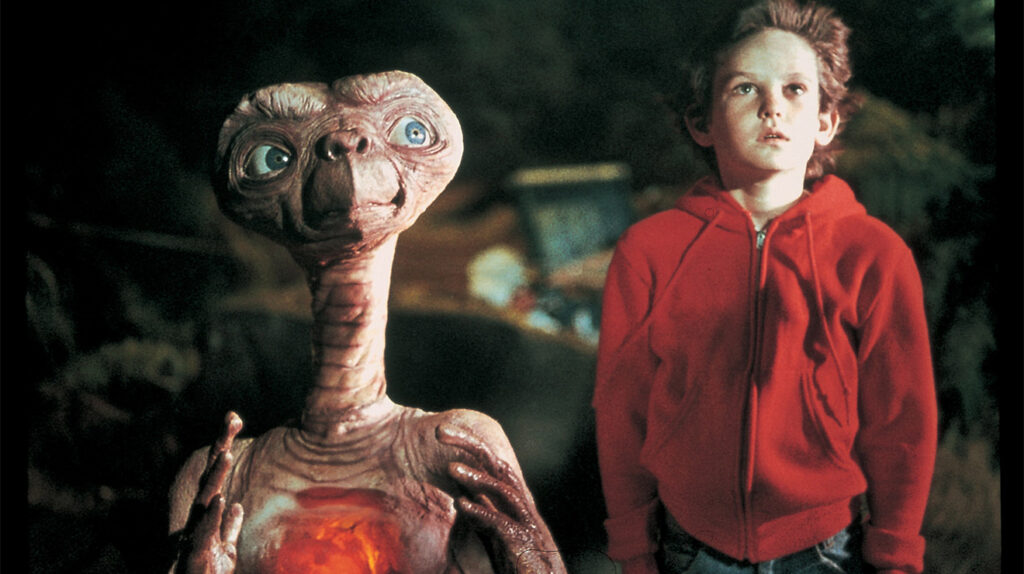
COMMUNITY, FILM, FAMILY, AND HOLIDAY PROGRAMMING
Denève and the SLSO open the season with the much-anticipated concert in Forest Park for a free night of music on Art Hill (September 19). The concert is performed in memory of Mary Ann Lee.
Film presentations with the SLSO playing the score live include E.T. the Extra-Terrestrial, led by Stéphane Denève(September 21-22); Coco (November 2-3); The Muppet Christmas Carol (December 14-15); and Casino Royale (March 8-9). On Mother’s Day weekend, the SLSO will present Disney Princess–The Concert (May 9-10) featuring songs from popular Disney films. All film presentations will take place at Stifel Theatre.
Holiday concerts include the popular IN UNISON Christmas concert, previously known as Gospel Christmas (December 13, 2024), which features a cappella group Take 6 and the IN UNISON Chorus led by Kevin McBeth. The Mercy Holiday Celebration presents four concerts of beloved holiday music with conductor Norman Huynh and vocalist Capathia Jenkins—two at the J. Scheidegger Center for the Arts at Lindenwood University in St. Charles (December 17-18, 2024) and two at Stifel Theatre (December 21-22, 2024). Former Assistant Conductor Stephanie Childress leads the annual New Year’s Eve Celebration Concert (December 31). The SLSO also performs its annual Lift Every Voice: Celebrating Black History Month concert with the IN UNISON Chorus and Broadway veteran Brian Stokes Mitchell (February 28).
In May 2024, the SLSO will announce plans for additional programming, including:
- Family Concerts, 45-minute performances designed for families with young children
- Special, one-night concerts that celebrate a breadth of musical styles and artists
- Programming for the 21st Live at the Pulitzer series, chamber music by composers of today programmed in response to art exhibitions at the Pulitzer Arts Foundation
- Programming for the second Live at The Sheldon series, a broad range of chamber music curated and performed by SLSO musicians at The Sheldon
OPERA THEATRE OF SAINT LOUIS
The SLSO will conclude its season as the resident orchestra of Opera Theatre of Saint Louis (OTSL), the 47th year of this partnership. The 2025 Festival Season runs May 24–June 29, 2025. Programming for OTSL’s 2025 Festival Season will be announced later this summer. The current 2024 Festival Season takes place this May and June; tickets and more information can be found at ExperienceOpera.org.
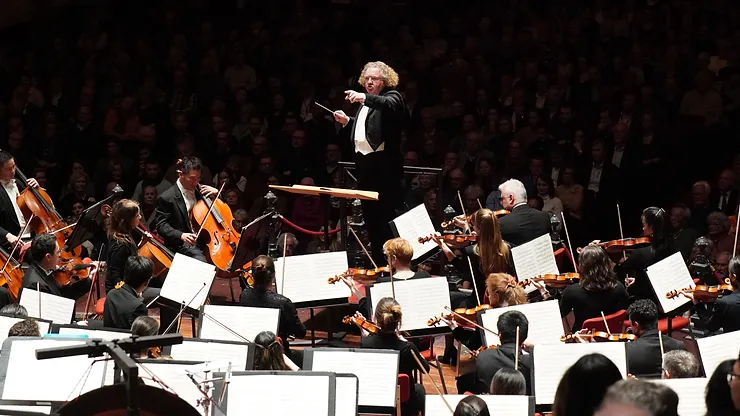
PREMIERES AND FIRST PERFORMANCES
Classical concerts in the 2024/2025 season include the first SLSO performances of 20 different works, with 12 by composers of today. Denève remains committed to discovering and performing works by living artists that will become mainstays of the orchestral repertoire, as well as developing deep relationships with composers of today.
World Premieres/SLSO commissions
Nina Shekhar Accordion Concerto (January 10-11, 2025)
Anna Clyne PALETTE (February 14-15, 2025)
U.S. Premiere/SLSO co-commission
Magnus Lindberg Viola Concerto (March 14 & 16, 2025)
U.S. Premieres
Daniel Slatkin Voyager 130 (October 25 & 27, 2024)
Guillaume Connesson Lost Horizons Violin Concerto (March 21-22, 2025)

First SLSO Performances
Mason Bates Nomad Concerto (September 27 & 29, 2024)
Gabriela Lena Frank Concertino Cusqueño (October 4 & 6, 2024)
Samuel Coleridge-Taylor Ballade(October 18-19, 2024)
James MacMillan One(October 18-19, 2024)
Domenico Scarlatti (arr. L. Slatkin) Five Sonatas for Orchestral Wind Ensemble (October 25 & 27, 2024)
Cindy McTee Timepiece (October 25 & 27, 2024)
W.A. Mozart Overture to Mitridate, rè di Ponto (November 15-16, 2024)
William Grant Still Threnody: In Memory of Jean Sibelius (November 22 & 24, 2024)
Outi Tarkiainen The Ring of Fire and Love (February 21 & 23, 2025)
Kevin Puts Hymn to the Sun (March 1-2, 2025)
J.S. Bach (arr. Elgar) Fantasia & Fugue in C minor (March 1-2, 2025)
John Williams Theme from Seven Years in Tibet (March 21-22, 2025)
Adolphus Hailstork An American Port of Call (March 21-22, 2025)
Jean Sibelius Lemminkäinen Suite (Four Legends from the Kalevala)(April 11-13, 2025)*
Grażyna Bacewicz Concerto for String Orchestra (April 26-27, 2025)
Edvard Grieg Peer Gynt (May 3-4, 2025)*
*First complete performances
MEDIA PARTNERSHIPS
The SLSO’s partnerships with 90.7 KWMU St. Louis Public Radio and Classic 107.3 continue with select Saturday night symphonic concerts broadcast and streamed online by St. Louis Public Radio for a 16th year, and simulcasts on Classic 107.3 continuing for a fifth year.
About the St. Louis Symphony Orchestra
Celebrated as one of today’s most exciting and enduring orchestras, the St. Louis Symphony Orchestra is the second-oldest orchestra in the country, marking its 145th year with the upcoming 2024/2025 season and its sixth with Stéphane Denève, The Joseph and Emily Rauh Pulitzer Music Director. Widely considered one of the leading American orchestras, the Grammy® Award-winning SLSO maintains its commitment to artistic excellence, educational impact, and community collaborations—all in service to its mission of enriching lives through the power of music.
The core of the SLSO’s artistic foundation is its dynamic partnership with Denève, whose energetic musicianship, visionary storytelling, and collaborative spirit have created stronger connections with local and visiting artists, as well as advanced the SLSO’s role as a leader in music education. The SLSO musical family also includes two resident choruses: the St. Louis Symphony Chorus, founded in 1976, performs choral-orchestral music from the Baroque era to today; and the St. Louis Symphony IN UNISON Chorus, founded in 1994, focuses on the performance and preservation of music from the African diaspora. The St. Louis Symphony Youth Orchestra, founded by Conductor Laureate Leonard Slatkin in 1970, is the region’s premiere training orchestra for high school and college students.
The transformational, 65,000-square foot expansion and renovation of the orchestra’s home, Powell Hall, begun in 2023, continues. Led by the internationally acclaimed architecture firm Snøhetta, the project will transform the audience and artistic experience while protecting Powell Hall’s historic character and celebrated acoustics, creating a state-of-the art center for community, innovation, and powerful music experiences. The revitalized Powell Hall will open in 2025 to coincide with the building’s centennial.
An integral part of the vibrant St. Louis community, the SLSO enjoys a long history of robust and enduring artistic collaborations with individuals and organizations locally and around the world. Orchestra musicians share dozens of education and community performances throughout the region each year at medical facilities, places of worship, community centers, and schools. For 20 years, the St. Louis Symphony Orchestra: Live at the Pulitzerseries has highlighted today’s leading musical voices through innovative performances in collaboration with, and reaction to the exhibitions at, the Pulitzer Arts Foundation. The SLSO has served as the resident orchestra for Opera Theatre of Saint Louis for more than 45 years. The orchestra also continues to develop new artistic collaborations, continuing a chamber music series in collaboration with The Sheldon, begun in the 23/24 season, as well as regular partnerships with The Muny, The Big Muddy Dance Company, the Saint Louis Art Museum, and others. Beyond the St. Louis region, the SLSO’s impact is realized through Saturday night concert broadcasts on St. Louis Public Radio and Classic 107.3, acclaimed recordings, regular touring activity, and a digital portfolio that includes a robust online education platform with digital concerts and learning activities for all ages.
Since the arrival of Marie-Hélène Bernard as President and CEO in 2015, the SLSO has aligned its mission to make music more accessible, while fostering a culture welcoming to all. Building on its momentum, the SLSO serves as a convener of individuals, creators, and ideas, and is committed to building community through compelling and inclusive musical experiences. As it continues its longstanding focus on equity, diversity, inclusion, and access, the SLSO embraces its strengths as a responsive, nimble organization, while investing in partnerships locally and elevating its presence globally. For more information, visit slso.org.
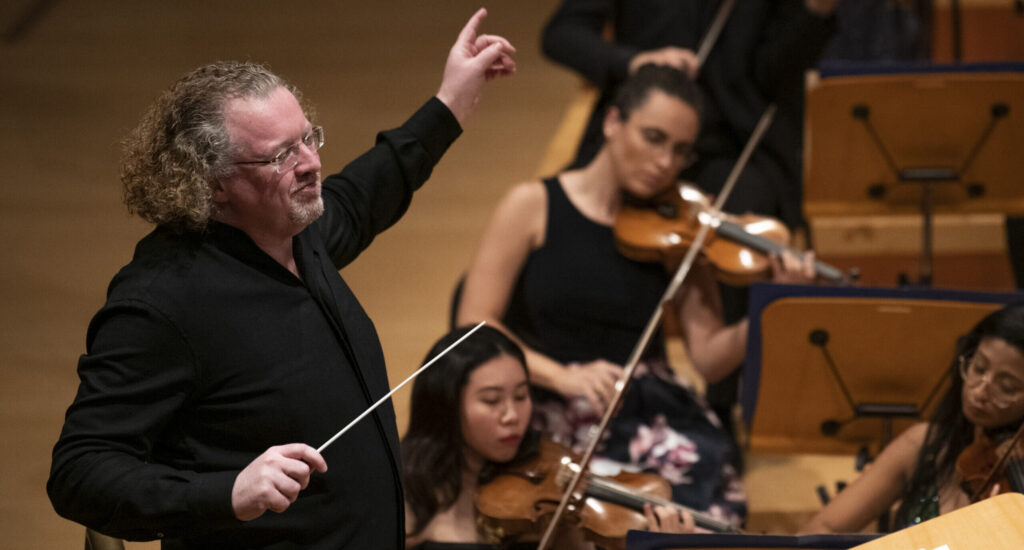
About Stéphane Denève, The Joseph and Emily Rauh Pulitzer Music Director
Stéphane Denève is The Joseph and Emily Rauh Pulitzer Music Director of the St. Louis Symphony Orchestra, the Artistic Director of the New World Symphony, and the Principal Guest Conductor of the Netherlands Radio Philharmonic. He recently concluded terms as Chief Conductor of the Brussels Philharmonic and Principal Guest Conductor of The Philadelphia Orchestra, and previously served as Chief Conductor of Stuttgart Radio Symphony Orchestra (SWR) and Music Director of the Royal Scottish National Orchestra.
Recognized internationally for the exceptional quality of his performances and programming, Denève regularly appears at major concert venues with the world’s greatest orchestras and soloists. He has a special affinity for the music of his native France, and is a passionate advocate for music of the 21st century.
He is a frequent guest with the New York Philharmonic, The Philadelphia Orchestra, The Cleveland Orchestra, Los Angeles Philharmonic, Royal Concertgebouw Orchestra, NHK Symphony Orchestra, Bavarian Radio Symphony Orchestra, Royal Stockholm Philharmonic Orchestra (with whom he conducted the 2020 Nobel Prize concert), Orchestre national de France, Czech Philharmonic, NDR Elbphilharmonie Orchestra, Vienna Symphony, DSO Berlin, Orchestre philharmonique de Radio France, and Rotterdam Philharmonic.
A graduate and prize-winner of the Paris Conservatoire, Stéphane Denève worked closely in his early career with Sir Georg Solti, Georges Prêtre and Seiji Ozawa. A gifted communicator and educator, he is committed to inspiring the next generation of musicians and listeners, and has worked regularly with young people in programmes such as those of the New World Symphony, Tanglewood Music Center, the Colburn School, the European Union Youth Orchestra, and the Music Academy of the West.
For further information, please visit www.stephanedeneve.com.

Lynn (Zipfel) Venhaus has had a continuous byline in St. Louis metro region publications since 1978. She writes features and news for Belleville News-Democrat and contributes to St. Louis magazine and other publications.
She is a Rotten Tomatoes-approved film critic, currently reviews films for Webster-Kirkwood Times and KTRS Radio, covers entertainment for PopLifeSTL.com and co-hosts podcast PopLifeSTL.com…Presents.
She is a member of Critics Choice Association, where she serves on the women’s and marketing committees; Alliance of Women Film Journalists; and on the board of the St. Louis Film Critics Association. She is a founding and board member of the St. Louis Theater Circle.
She is retired from teaching journalism/media as an adjunct college instructor.

